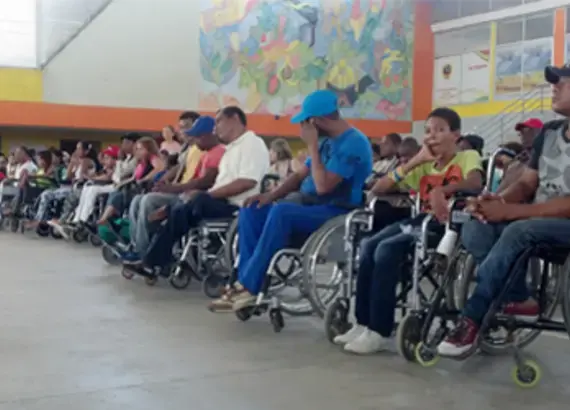
Success Story
Public Hearing in Cartagena on Disability Policies
Colombia’s coastal city of Cartagena with its historic buildings and charm is a prime tourist destination. But Colombians with disabilities who live there have long struggled for political attention and public policies that address their needs. They made a significant gain in 2011, when the municipal council passed a law to improve health care, education and accessibility for citizens with disabilities, but the council took no immediate steps to carry it out, delaying much-needed services.
But now, thanks to the protracted efforts of one of NDI’s Colombian civic partners, that situation has started to change. This month, Cartagena held its first public hearing – a Cabildo Abierto – focused exclusively on special municipal policies to improve the daily lives of the city’s citizens with disabilities. The hearing was the result of a 16-month advocacy campaign by the Colombian organization Inside Ocean (Mar Adentro), in collaboration with 22 other organizations. Their demands focused on improving the access of citizens with disabilities to public life and citizen participation, and included conducting a new census to accurately reflect the population of people with disabilities; making schools, sidewalks and public transportation more accessible to people with disabilities; and providing sensitivity and accommodation training for government employees, especially those in the health and judicial sectors.
The April 10 hearing attracted more than 600 people with disabilities in Cartagena and included special presentations in Braille and sign language. Representatives from the Colombian Ministry of the Interior and other government agencies and foundations attended and committed to support municipal plans to meet the special needs of citizens with disabilities.
To initiate the proceeding, Inside Ocean, with NDI technical assistance, took advantage of a rarely used legal mechanism by which citizens can oblige city authorities to convene a public hearing by petition. With the assistance of seven other organizations, Inside Ocean submitted 4,248 valid signatures to city authorities, surpassing the minimum 3,400 needed. The process itself raised awareness about some of the political alienation that people with disabilities experience. For example, the signatures needed to be filed in legible handwriting, which excluded citizens with disabilities, including those who communicate in Braille and sign language.
Organizing a public hearing in Cartagena required the active and consistent engagement of more than 90 citizens. With the help of NDI, which developed guides that Inside Ocean and its allies used to train activists, people with disabilies in Cartagena spread awareness about their rights in the community.
NDI Resident Program Officer Andrés Osorio said, “Community members with disabilities were determined to organize and have their rights recognized. This motivated them to jump through all the bureaucratic hoops, advocate for their cause in their personal circles, and do so for months until their objectives were achieved.”
Organizers of the public hearing have also gained formal recognition for their efforts, winning first prize in the Colombian Ministry of the Interior’s Regional Strategy on Social Inclusion competition, from a pool of 57 competing organizations. They used the prize money (3 million Colombian pesos, or around $1,210 USD) to purchase office equipment, which they have made available to any advocacy group for people with disabilities that needs it. It may take time for the government to respond to all of the group’s petitions, but two days after the public hearing was held, the government announced that it would conduct a new census, fulfilling the first of the group’s requests.
Published on May 4, 2015
